KEY TAKEAWAYS
- The phase 1 ongoing DRAGON study explored SRK-181 (given in different doses) with anti-PD-(L)1 for patients with various cancers, focusing on efficacy in relapsed/refractory cases.
- Biomarker assessment included biopsies with immunohistochemistry and circulatory MDSC analysis using flow cytometry.
- Biomarker results aligned with preclinical findings, confirming SRK-181’s ability to target latent TGFb1 and overcome immune suppression in CPI-resistant environments. Part B enrollment has concluded.
SRK-181, a fully human IgG4 monoclonal antibody, is currently under investigation for its selective binding to latent transforming growth factor-beta 1 (TGFβ1). The activation of TGFβ1 has been linked to resistance to checkpoint inhibitors (CPI) across various cancer types.
To validate SRK-181’s mechanism in patients and assess treatment response, a comprehensive biomarker strategy was developed, building on the proof of concept established in preclinical models.
Preclinical data demonstrated that the combination of SRK-181 and anti-PD1 effectively overcame immune exclusion within the tumor microenvironment. This led to a notable influx of effector T cells into tumors, correlating with tumor regression and significant survival benefits.
In the expansion phase (Part B), anti-PD-(L)1 relapsed/refractory patients with clear cell renal cell carcinoma, non-small cell lung cancer, melanoma, urothelial carcinoma, or head and neck cancer receive SRK-181 at either 1500mg q3w or 1000mg q2w in combination with anti-PD-(L)1.
Biomarker assessment involves immunohistochemistry for biopsies and flow cytometry for circulatory Myeloid Derived Suppressor Cells (MDSC). Biopsies are collected at baseline and post-treatment between Days 28 – 48.
The mechanism of immunosuppression leading to checkpoint inhibitor (CPI) resistance in melanoma and urothelial cancers involves the exclusion of CD8+ T cells from the tumor. As of June 21, three paired biopsies, meeting quality standards, underwent staining for CD8.
In all three paired biopsies, the administration of SRK-181 and anti-PD1 demonstrated an augmented influx of CD8+ T cells into tumors. Furthermore, the combined treatment led to a reduction in circulatory levels of immunosuppressive Myeloid Derived Suppressor Cells (MDSC).
The biomarker outcomes from the DRAGON study align with preclinical observations, substantiating in a clinical setting that the selective targeting of latent TGFb1 with SRK-181 can counter the immune suppressive environment linked to CPI resistance. Enrollment for Part B is currently in progress.
Source: https://jitc.bmj.com/content/11/Suppl_1/A821
Clinical Trial: https://clinicaltrials.gov/study/NCT04291079
Henry S, DeWall S, Vaishampayan UN, et al726 Establishing proof of mechanism in patients: preliminary biomarker data of SRK-181 (a latent TGFβ1 inhibitor) from DRAGON StudyJournal for ImmunoTherapy of Cancer :doi: 10.1136/jitc-2023-SITC2023.0726



